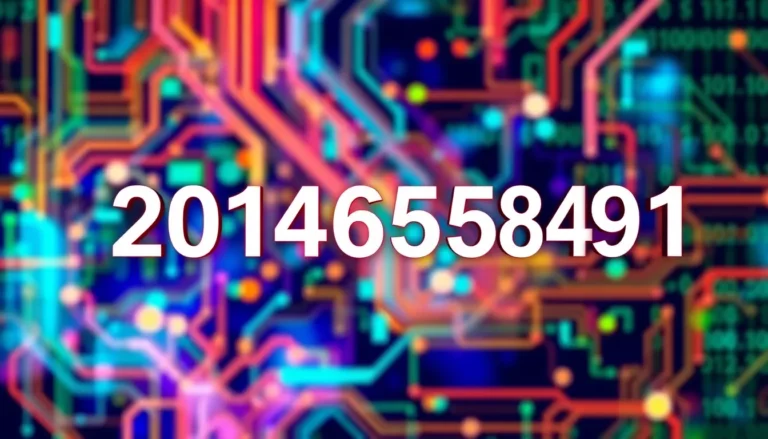In a world where your toaster might just be smarter than you, the Industrial Internet of Things (IIoT) is revolutionizing how companies operate. Imagine factories where machines chat over coffee, optimizing production without a human in sight. Sounds like science fiction? It’s happening right now, and the companies leading this charge are changing the game.
These IIoT pioneers are harnessing data to boost efficiency, reduce downtime, and make even the most mundane tasks feel like a high-stakes video game. With sensors and connectivity, they’re turning traditional industries into smart ecosystems. If you think your morning coffee is complex, wait until you see how these companies brew innovation on an industrial scale. Buckle up as we dive into the fascinating world of IIoT companies that are not just keeping up with the times but are setting the pace for the future.
Table of Contents
ToggleOverview of Industrial Internet of Things Companies
Industrial Internet of Things companies play a crucial role in the evolution of manufacturing and logistics. These businesses equip factories with sensors that generate real-time data, enhancing operational efficiency. Many leaders in this field create platforms that facilitate seamless machine communication, allowing for data-driven decision-making.
Cisco focuses on network connectivity, providing solutions that streamline operations and security in industrial settings. General Electric excels in integrating data analytics into their machinery offerings, enabling predictive maintenance and reducing downtime. Siemens combines automation with intelligence, delivering IoT solutions that optimize production processes across various sectors.
One notable example is Honeywell, which develops advanced software for monitoring equipment performance in real-time. Rockwell Automation offers solutions that empower manufacturers to connect devices and analyze data for improved operational transparency.
Each of these companies contributes uniquely to the IIoT landscape, providing tools that support increased productivity and cost savings. By implementing these cutting-edge technologies, traditional industries transform into interconnected ecosystems that optimize every aspect of production.
Companies such as these demonstrate the synergistic value of integrating IoT into industrial settings, showcasing increased efficiency and competitiveness in the market. Their innovations set new standards, paving the way for future advancements within the Industrial Internet of Things paradigm.
Key Players in the Industry

The Industrial Internet of Things (IIoT) ecosystem features a blend of established technology leaders and innovative startups. These companies drive advancements, enhance connectivity, and refine operational processes.
Technology Leaders
Cisco excels in network solutions, creating strong communication frameworks vital for IIoT integrations. Siemens focuses on automation and controls, developing systems that improve manufacturing efficiency. General Electric emphasizes industrial analytics, utilizing data insights to boost productivity across sectors. Rockwell Automation provides advanced monitoring tools, ensuring devices communicate effectively for real-time decision-making. Honeywell’s contributions lie in safety and efficiency, equipping industries with smart technologies that streamline operations. Together, these leaders shape the IIoT landscape, establishing benchmarks for innovation and operational excellence.
Emerging Startups
Startups add fresh perspectives and agility to the IIoT sector. Element Analytics specializes in data management, allowing industries to harness insights from sensor data. FogHorn Systems integrates edge computing, enabling real-time processing for critical applications in manufacturing. Witekio excels in embedded systems, creating software solutions that enhance device connectivity. MachineMetrics focuses on machine data analytics, offering manufacturers tools to optimize performance and reduce downtime. These emerging players drive creativity and competition within the market, pushing the boundaries of IIoT capabilities and inspiring traditional companies to adapt.
Applications of Industrial Internet of Things
Industrial Internet of Things (IIoT) facilitates transformative applications across various sectors. The integration of advanced technology optimizes operations in significant ways.
Manufacturing
IIoT enhances manufacturing through real-time data analytics. Sensors monitor machines and production lines, providing critical insights that prevent downtime. Companies like General Electric implement predictive maintenance to foresee equipment failures before they occur. Connectivity between devices supports streamlined operations and boosts overall efficiency. Increased automation reduces human error and accelerates production cycles, enabling manufacturers to adapt quickly to market demands. Real-time monitoring also improves quality control, ensuring product specifications align with customer requirements.
Supply Chain Management
Supply chain management benefits significantly from IIoT technologies. Real-time tracking of goods illustrates a clear view of inventory levels across multiple locations. Cisco’s solutions provide data-driven insights that improve demand forecasting and inventory management. Enhanced visibility helps identify bottlenecks and optimize logistics processes. Additionally, IIoT empowers companies to respond promptly to disruptions or delays, ensuring timely deliveries. Collaboration among stakeholders strengthens partnerships, fostering more responsive and resilient supply chains. As a result, businesses experience greater operational efficiency and cost savings through these IIoT-powered advancements.
Challenges Facing Industrial Internet of Things Companies
Industrial Internet of Things (IIoT) companies face significant challenges that can hinder their growth and productivity. These include data security concerns and integration issues.
Data Security
Data security poses a critical threat to IIoT companies. Cyberattacks increase in sophistication, and vulnerabilities in connected devices can lead to data breaches. Organizations must implement robust security measures, such as encryption and access controls, to protect sensitive information. Additionally, ongoing updates ensure that systems remain secure. Compliance with industry standards also becomes essential; adhering to regulations helps companies safeguard their data. A proactive approach towards potential security threats mitigates risks and builds trust with clients.
Integration Issues
Integration issues frequently arise as companies adopt IIoT solutions. Many organizations utilize legacy systems that may not easily connect with newer technologies. Ensuring seamless compatibility across various platforms requires careful planning and execution. Companies often encounter challenges in standardizing communication protocols, which can hinder data exchange. Collaborating with vendors that support interoperability aids in overcoming these integration hurdles. A strategic approach towards system unification enhances overall efficiency, enabling smoother operations within the IIoT landscape.
Future Trends in the Industrial Internet of Things
The Industrial Internet of Things (IIoT) continues to evolve rapidly, with several trends shaping its landscape. Companies increasingly adopt edge computing to process data closer to the source, reducing latency and improving response times. This shift enhances real-time decision-making and optimizes operations across sectors.
Adoption of artificial intelligence drives further advancements. AI algorithms analyze vast amounts of data from IIoT devices, delivering insights that enhance predictive maintenance and reduce downtime. These capabilities enable organizations to streamline processes and extend equipment lifespan.
Cybersecurity remains a pivotal focus. As IIoT devices proliferate, companies invest in robust security measures to protect sensitive data. Encryption, multi-factor authentication, and regular audits form a resilient defense against evolving cyber threats.
Integration of machine learning into IIoT systems fosters continued innovation. This technology enables devices to learn from data patterns, improving accuracy and efficiency over time. By leveraging machine learning, companies can identify anomalies and optimize workflows seamlessly.
Sustainability is gaining traction in IIoT initiatives. Many organizations prioritize energy efficiency and waste reduction, employing IIoT technologies to monitor resource usage in real-time. Such strategies contribute to environmental goals while driving operational cost savings.
Collaboration between established firms and startups shapes future developments. Partnerships between industry giants and agile innovators lead to cutting-edge solutions that challenge traditional practices. Together, they push the boundaries of IIoT applications, creating a dynamic environment for growth.
Overall, these trends signal a transformative future for IIoT sectors. Enhanced connectivity, intelligence, and security create a robust framework that businesses leverage to optimize performance and navigate challenges ahead.
The Industrial Internet of Things is reshaping industries by fostering innovation and efficiency. As companies integrate advanced technologies and data analytics, they’re not just adapting but thriving in a competitive landscape. The collaboration between established giants and agile startups is crucial for driving progress and overcoming challenges.
With a focus on security and seamless integration, these companies are setting the stage for a future where smart ecosystems enhance productivity and sustainability. As IIoT continues to evolve, the potential for transformative change remains vast, promising exciting developments for businesses and industries alike.



